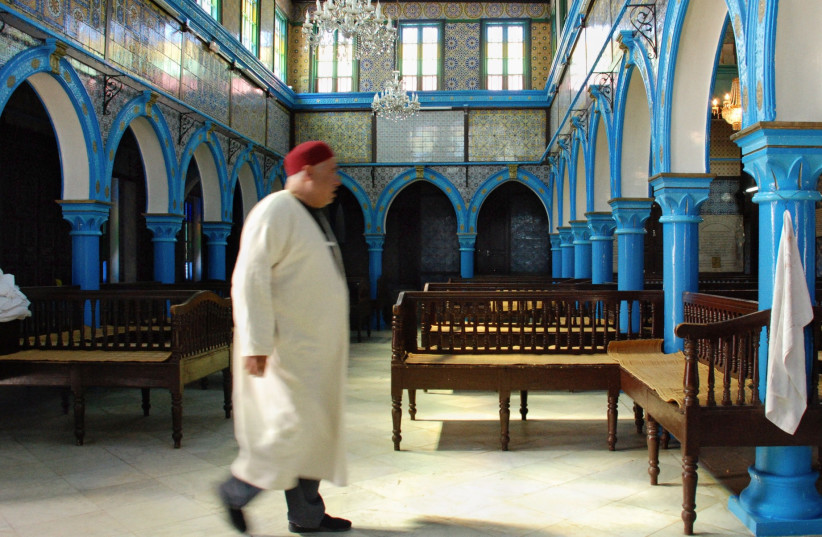Earlier this month, one of the annual highlights of Jewish life in Djerba, Tunisia, was transformed from celebration to sorrow as a gunman murdered two Jewish pilgrims and three law enforcement personnel – and would have harmed countless others were it not for the swift actions of Tunisian security forces.
I was one of the first foreign visitors permitted to visit the scene of the attack, less than 48 hours after it took place. I encountered a community filled with raw grief and still in shock after this horrific act of violence. We sat with family members and learned about the lives of their relatives – lives that had been cut short in a hail of bullets. I embraced a young man as we wept together. There was a sense of loss, yes, but also an undercurrent of grim determination that this community would carry on.
I joined the local Hevra Kadisha – Jewish burial society – to prepare the deceased for burial in accordance with the unique Djerba customs. Judaism teaches that there is no more righteous individual than one whose life has been taken simply for being Jewish. Such individuals are known as kedoshim – sacred ones – and we are honored to help bring them to their final resting place, even as we are filled with grief for their passing.
In Djerba, we were hosted at the home of Tunisia’s Chief Rabbi Rav Haim Bitan, whose resilience and determination to soldier on, come what may, is so clearly an inspiration to the entire Jewish community. At La Ghriba Synagogue – the continent’s oldest synagogue and now the site of the shooting – I joined Imam Hassen Chalghoumi of Drancy, France, as well as other faith leaders in praying for the families of the victims.
We prayed, too, for the souls of the police officers who had heroically given their lives and those who had been injured to avert what could have been a far, far greater tragedy. While the response of the authorities to this incident – and the treatment of the Jewish community in Djerba in general – needs improvement, we are grateful to the local law enforcement officers who put their lives on the line in defense of the synagogue and the community..

And we came away from our visit determined to respond to this incident of hatred not by being afraid, but by redoubling our efforts to lead the thriving Jewish communities across the Islamic world.
Chabad envoys gather in Morocco
IT WOULD have been easy to have a knee-jerk response to this heinous act committed by a lone evil individual, and to call for Jewish people to keep a low profile, to hide away. Instead, from May 15-17, more than 60 Chabad-Lubavitch emissary families representing Jewish communities in dozens of European, African and Muslim-majority countries gathered proudly in Morocco.
We did so to demonstrate the longstanding and firm bonds of friendship and peaceful coexistence that have existed for centuries between Jewish and Muslim communities across the globe.
We began the conference in Fez, as we gathered at the historic home of Maimonides, the 12th-century scholar whose works continue to be a cornerstone of Jewish law, theology and philosophy. We celebrated the siyum – completion of the annual study cycle of the Mishna Torah, Maimonides’s magnum opus digest of Jewish law.
While this marked the largest gathering of Chabad-Lubavitch rabbis in Morocco, this was not the first siyum to take place in Fez – that took place in 1985, a year after the Rebbe, Rabbi Menachem M. Schneerson, of righteous memory, had launched the Maimonides study cycle. The Rebbe held dear the Jewish communities across the Muslim world – in fact, the very first emissary the Rebbe sent out (today there are more than 10,000) was to Morocco, more than 70 years ago.
Jewish life in Islamic countries flourishes again
On Wednesday, another two notable siyum celebrations took place – one in the historic Eliyahu Hanavi Synagogue in Alexandria, Egypt, and the other in the venerable Shaar Hashamayim Synagogue in Cairo, where Maimonides eventually settled and became famous as the physician to Sultan Saladin. Today, Jewish life in Egypt has begun to flourish once more, as visitors and residents are welcomed with the hospitality for which the region is justly famous.
This beautiful gathering in Morocco of rabbis from across the region underscores the tremendous growth the Jewish communities in Morocco and across the Muslim world have seen, and the beautiful spirit of tolerance and friendship espoused by His Majesty, Mohammed VI, King of Morocco, who recognizes and honors Jewish life and the long and proud history of Morocco’s Jewish community. Today, Jewish history and culture are part of the curriculum in Morocco’s schools, fostering an atmosphere of mutual respect – one I feel privileged to have experienced.
Yes, Jewish life has its difficult, even tragic moments – but it is in the response to those tragedies that I can see how Jewish communities have thrived throughout the Islamic world, and how they continue to do so today.
The writer serves as the Ashkenazi rabbi of Turkiye and chair of the Alliance of Rabbis in Islamic States. (www.rabbisalliance.org) Follow him on Twitter @mchitrik.
